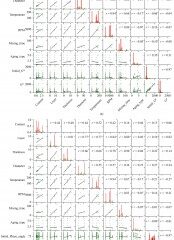Health
Understanding the Profound Impact of PTSD on Health

Post-Traumatic Stress Disorder (PTSD) significantly affects both the mental and physical health of service members, according to Dr. Sofia Matta, senior director of medical services at Home Base. This condition, often overlooked, has become increasingly prevalent among veterans returning from service.
PTSD arises from traumatic experiences, leading to symptoms that can disrupt daily life. Many individuals affected by PTSD experience anxiety, depression, and intrusive memories. Dr. Matta emphasizes that the ramifications extend beyond mental health, impacting physical well-being as well.
Understanding the Scope of the Problem
Statistics reveal that approximately 11-20% of veterans who served in Operations Iraqi Freedom and Enduring Freedom experience PTSD in a given year, according to the U.S. Department of Veterans Affairs. This figure rises to 30% for veterans who have served in Vietnam. Despite the staggering prevalence, many service members remain undiagnosed or untreated, often due to stigma associated with mental health issues.
The physical health implications of PTSD are profound. Research shows that individuals with PTSD are at a higher risk for chronic conditions such as cardiovascular disease, diabetes, and obesity. This relationship highlights the necessity for comprehensive healthcare approaches that address both mental and physical health.
Breaking Down Barriers to Treatment
Dr. Matta notes that access to appropriate treatment options can be challenging for many veterans. Barriers include a lack of awareness about available resources and the hesitation to seek help due to societal perceptions of mental health.
“Many service members feel they must be strong and resilient,” Dr. Matta explains. “This mindset can prevent them from reaching out for the support they need.” To combat this, Home Base offers programs that provide mental health education, support, and resources tailored to veterans and their families.
Moreover, initiatives aimed at reducing stigma are crucial. Encouraging open conversations about mental health can foster an environment where service members feel safe discussing their experiences.
The importance of community support cannot be overstated. Organizations like Home Base work to create networks that connect veterans with others who have faced similar challenges. These connections can be instrumental in the healing process, offering a sense of understanding and belonging.
The ongoing efforts to address PTSD among service members highlight a critical need for public awareness and policy change. By prioritizing mental health care, society can better support those who have dedicated their lives to serving their country.
As the conversation surrounding mental health evolves, it is vital to recognize the complex interplay between PTSD and overall health. By understanding the impact of this condition, communities can work towards creating more effective support systems for veterans, ultimately leading to improved health outcomes for those affected.
-

 Technology5 months ago
Technology5 months agoDiscover the Top 10 Calorie Counting Apps of 2025
-

 Health3 months ago
Health3 months agoBella Hadid Shares Health Update After Treatment for Lyme Disease
-

 Health3 months ago
Health3 months agoErin Bates Shares Recovery Update Following Sepsis Complications
-

 Technology4 months ago
Technology4 months agoDiscover How to Reverse Image Search Using ChatGPT Effortlessly
-

 Technology1 month ago
Technology1 month agoDiscover 2025’s Top GPUs for Exceptional 4K Gaming Performance
-

 Technology3 months ago
Technology3 months agoElectric Moto Influencer Surronster Arrested in Tijuana
-

 Technology5 months ago
Technology5 months agoMeta Initiates $60B AI Data Center Expansion, Starting in Ohio
-

 Technology5 months ago
Technology5 months agoRecovering a Suspended TikTok Account: A Step-by-Step Guide
-

 Health4 months ago
Health4 months agoTested: Rab Firewall Mountain Jacket Survives Harsh Conditions
-

 Lifestyle5 months ago
Lifestyle5 months agoBelton Family Reunites After Daughter Survives Hill Country Floods
-

 Health3 months ago
Health3 months agoAnalysts Project Stronger Growth for Apple’s iPhone 17 Lineup
-

 Technology4 months ago
Technology4 months agoHarmonic Launches AI Chatbot App to Transform Mathematical Reasoning





















